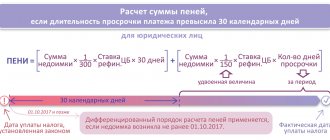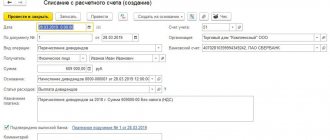How to reflect fines for tax offenses and penalties for arrears in accounting and taxation
Questions and answers on the topic
How to reflect in accounting. accounting and taxation of penalties/fines from the Pension Fund of Russia, Social Insurance Fund, tax authorities (postings)
In accounting, fines and penalties can be combined into one category of accounting objects - tax sanctions.
Thus, reflect the amount of accrued tax sanctions in the debit of account 99 “Profits and losses” in correspondence with account 68 “Calculations for taxes and fees” or 69 “Calculations for social insurance and security”.
In accounting, reflect the accrual of tax sanctions by posting:
Debit 99 Credit 68 (69) subaccount “Fines (penalties)” – a fine has been charged for a tax offense (fines for arrears).
When calculating the single tax, the amount of tax sanctions (fines, fines) from the Pension Fund of the Russian Federation, Social Insurance Fund, and tax authorities are not taken into account.
The rationale for this position is given below in the recommendations of the Glavbukh System.
Situation: How to reflect fines for tax offenses and penalties for arrears in accounting and taxation
Fines for tax violations and penalties are reflected in accounting as part of tax sanctions. When calculating income tax, do not take into account fines and penalties.*
Tax legislation separates the concepts of “penalty” and “fine”. A penalty is an amount of money that an organization must transfer to the budget in case of untimely fulfillment of its obligation to pay tax (Clause 1, Article 75 of the Tax Code of the Russian Federation). A fine is a tax sanction that is collected from an organization for a tax offense (Article 114 of the Tax Code of the Russian Federation). The amounts of fines for tax offenses are shown in the table.
For accounting purposes, fines and penalties can be combined into one category of accounting objects - tax sanctions.* This approach does not contradict the objectives of accounting, in particular, providing complete and reliable information about the activities of the organization and the basic principles of its management - rationality and the priority of content over form (clause. 1 Article 13 of the Law of December 6, 2011 No. 402-FZ, clause 10 of the Regulations on accounting and reporting).
The amount of accrued tax sanctions does not form a conditional income tax expense (clause 83 of the Accounting and Reporting Regulations, clause 20 of PBU 18/02). Therefore, in accounting, reflect these amounts directly on account 99 “Profits and losses” in correspondence with account 68 “Calculations for taxes and fees” (69 “Calculations for social insurance and security”). To ensure analytical accounting of tax sanctions for accounts 68, 69, it is advisable to open sub-accounts in the context of taxes for which sanctions are accrued (for example, the sub-account “Fines (penalties) for income tax”).*
Reflect the accrual of tax sanctions by posting:*
Debit 99 Credit 68 (69) subaccount “Fines (penalties)” – a fine has been charged for a tax offense (fines for arrears).
When calculating income tax, the organization does not have the right to take into account the amount of fines and penalties (clause 2 of Article 270 of the Tax Code of the Russian Federation).*
An example of how tax sanctions (fines and penalties) are reflected in accounting and taxation*
Based on the results of six months, the following data is reflected in Zvezda’s accounting: – on the loan of subaccount 90-1 – sales revenue in the amount of 11,800,000 rubles; – on the debit of subaccount 90-2 – cost of goods sold in the amount of 7,500,000 rubles; – on the debit of subaccount 90-3 – VAT on sales proceeds in the amount of 1,800,000 rubles.
In June, based on the results of a tax audit, the organization was assessed penalties in the amount of 200,000 rubles. and a fine of 250,000 rubles. on income tax.
When closing the reporting period, the financial result was generated in accounting:
Debit 90-9 Credit 99 subaccount “Profit (loss) before tax” – 2,500,000 rubles. (11,800,000 rubles – 1,800,000 rubles – 7,500,000 rubles) – profit from sales for six months is reflected;
Debit 99 subaccount “Conditional income tax expense” Credit 68 subaccount “Calculations for income tax” – 500,000 rubles. (RUB 2,500,000 × 20%) – the amount of conditional income tax expense has been accrued.
The amounts of tax sanctions were not taken into account when forming the financial result. The accountant reflected the accrual of sanctions by posting:
Debit 99 Credit 68 subaccount “Fines (penalties) for income tax” - 450,000 rubles. – fines and penalties for income tax were assessed.
In the Balance Sheet, the amount of tax sanctions participates in the formation of the indicator in line 1370 “Retained earnings (uncovered loss)” (clause 83 of the Regulations on Accounting and Reporting). In the Statement of Financial Results, the amount of sanctions can be reflected in line 2460 “Other”.
The report on financial results in terms of the formation of calculations for income tax and net profit (loss) was compiled by the Zvezda accountant as follows:
www.26-2.ru
Postings when calculating fines and penalties for taxes
In the course of their work, every accountant is faced with such concepts as fines and penalties, for example, when violating the laws on taxes and fees.
In this article, we will study where to include tax fines in accounting, as well as the main entries for the accrual and payment of penalties, fines for taxes: profit, VAT, insurance premiums.
Contents In accounting, there are several reasons for accruing fines and penalties:
- Payment of tax and insurance premiums within unspecified terms;
- Late submission of the report;
- Understatement of tax liability.
It should be noted that a fine and a penalty are different concepts:
- The fine is assessed immediately when the above reasons occur.
In addition, its size is clearly regulated by deadlines at the legislative level. - A penalty is a penalty payment that is charged for each day of late payment as a percentage of 1/300 of the refinancing rate of the Central Bank of the Russian Federation.
The procedure for collecting taxes and penalties from organizations: To display the costs incurred that arise when fines and penalties are calculated, account 99 Profit and losses is used. For convenience, it is divided into two subcontos - penalties and fines. The debit of this account corresponds with the corresponding tax payment, which is displayed on the credit of accounts 68 and 69.
There are opinions in accounting circles that account 91 Other expenses can also be used to display accrued penalties and fines.
Penalty for late submission of reports in the SZV-M form
Questions and answers on the topic
Based on what law is it necessary to submit monthly information on working pensioners? What is the reason for this and what is the penalty for late submission of SZV-M data?
On April 1, 2021, amendments introduced by Federal Law dated December 29, 2015 No. 385-FZ came into force. And now, in accordance with paragraph 2.2 of Article 11 of Federal Law No. 27-FZ dated April 1, 1996, all employers are obliged to provide the Pension Fund of the Russian Federation with information about each insured person working for them (including persons who have entered into civil contracts) on a monthly basis no later than the 10th day of the next month. .
Thus, information must be submitted not only for working pensioners, but simply for all persons with whom you have concluded employment or civil law contracts. This information is submitted in the SZV-M form, approved by Resolution of the Pension Fund Board of February 1, 2016 No. 83p. It must indicate for all persons with whom employment or civil law contracts have been concluded:
Penalties for failure to submit SZV-M
If you submit your report late, you may be subject to a fine. The fine is 500 rubles. for each employee for whom information has not been submitted (clause 4 of article 17 of Law No. 27-FZ). Pension Fund employees may charge the same amount of fine if you provide incomplete or false information about employees. Let's say you have 35 people working for you, and you are late with the report, then you can be fined 17,500 rubles. (35 people x 500 rub.).
Let us explain that the Pension Fund of the Russian Federation introduced a new form of monthly reporting in order to control the payment of pensions to working pensioners. The fact is that in 2021, pensions for working pensioners will not be indexed. However, despite this, it is necessary to submit a new reporting form (SZV-M) for all employees: both for persons of retirement age and for those who do not receive a pension.
www.26-2.ru
Tax penalties
To begin with, let us determine that the nature of such a violation depends on what kind of reporting was untimely submitted to the competent authorities. Tax fines are a type of tax sanctions that are applied in accordance with Art. 114 of the Tax Code of the Russian Federation to taxpayers for offenses committed in this area. Such fines are paid by the enterprise solely on the basis of the decision of the Federal Tax Service, and the costs of paying for such a violation in accounting are included in the expenses of the reporting period.
The amount of fines is presented in Table 1.
Table 1 - Calculation of the amount of penalties for late submission of reports
But the fine cannot exceed 30% of the total tax amount.
The main thing to understand is that the amount of the fine, despite being an expense, does not reduce the size of the tax base. The correspondence of accounts itself takes place using accounts 99, 68 and 69.
An example of a cycle of transactions that an enterprise must make as a result of paying a fine for late filing of an income tax return:
- Calculation of VAT fine: D-t 99, K-t 68;
- The accrued fine has been paid: D-t 68, K-t 51;
Important: the amount of penalties accrued for taxes cannot be attributed to tax sanctions in accordance with the Tax Code, therefore, to reflect entries for penalties, not 99, but 91 accounts are used.
Form 6-NDFL
Legal entities and individuals may be fined for late submission of a report in Form 6-NDFL, which reflects all the employee’s income tax accruals. And the minimum amount of the fine in accordance with the Tax Code is 1000 rubles for each month. And even if the reporting, for example, is overdue by 5 months and 2 days, then you will have to pay the fine in 6 months.
But such a fine is charged monthly in case of failure to submit reports. The following question arises: what if the reporting is submitted, but incorrectly, and it needs to be clarified? In this case, the amount of the fine will not be 1000, but 500 rubles for each month of an incorrectly submitted form.
The costs of paying the fine will also be charged to account 99, expenses (
Penalties on posting contributions
For example, if the SZV-M report was not submitted at all, then the organization is subject to a fine of 500 rubles * number of employees.
If the company employs 30 people, then the fine for not passing the SZV-M will be 500 * 30 = 15,000. What if there are 200 or 300 employees? These are very large amounts, so it is worth submitting all documents to the relevant regulatory authorities in a timely manner. VAT dt 19.03 kt 60 VAT is reflected on purchased works (services) used for the production of goods (works, services) subject to VAT dt 19.
04 kt 60 VAT is written off VAT is written off on acquired inventories used for the production of goods (works, services) not subject to VAT dt 20, 23, 25, 29 kt 19.
03 VAT on purchased works (services) used for the production of goods (works, services) not subject to VAT is written off dt 20, 23, 25, 29 kt 19.
04 Restoration of VAT Restoration of VAT previously submitted for reimbursement from the budget on purchased inventory items used for the production of goods (works, services) not subject to VAT dt 20, 23, 25, 29 kt 19.03 Restoration of VAT previously submitted for reimbursement from the budget purchased works (services) used for the production of goods (works, services) not subject to VAT.
Penalty for failure to submit a report to the Pension Fund
By the way, the Pension Fund fine is the only one that is calculated not on the number and level of errors, not on the size of underpayments, but only on the presence and number of employees of the organization or individual entrepreneur.
It turns out that for the same mistake (for example, an error in the SNILS of one employee or failure to submit a report), a company with a large number of employees will have to pay many times more than if the organization has 2-3 employees.
Therefore, it is better for large companies not to make mistakes, because such a mistake can cost them a decent amount.
- When a Pension Fund specialist detects late submission of reporting forms by the policyholder (company or individual employer), he draws up a report of the violation.
- The completed document about the offense is handed over to the employer.
- The employer has the right to provide reasoned objections within 15 days after receiving the report, which can help avoid or reduce the fine for failure to submit a report to the Pension Fund.
- After considering the reasoned objections of the entrepreneur or legal entity, a final decision is made on whether to prosecute or on the absence of grounds for punishment, of which the policyholder is notified in writing.
- The next step is to send a demand to the employer to pay a fine.
- The last stage is the repayment of penalties or their forced collection in court.
- A collection order is sent to the payer's bank;
- By a court decision, bailiffs can collect the required amount of debt from the debtor’s property assets;
- If the debtor is an individual, then debt collection may occur through confiscation of the payer's assets.
Let's consider how justified the opinion of the judges and the Pension Fund itself is.
The arbitration courts found that from the calculation of penalties available in the case materials, it is impossible to determine the amount of debt for which penalties were accrued, the reporting (calculation) period for the formation of arrears, the timing of payment of insurance premiums, and therefore the courts came to the conclusion that the applicant did not provide evidence sending to the Company a demand for payment of penalties accrued on the disputed amount of debt on insurance premiums.
Penalty for late delivery of certificates in 2021
Info You should also pay attention: in 2021, the amount of the fine for late submission of reports in 2021 cannot exceed 30% of the amount that the company must pay to the budget. But also the amount of sanctions cannot be less than 1000 rubles.
Question: what to do when funds have been paid into the budget, but the declaration has not been submitted. In this case, the fine is calculated on the amount of the debt, that is, the difference between what had to be paid and what was paid.
Important If such a difference is 0, then the company must pay the established minimum - 1000 rubles. Example: An enterprise submitted reports on insurance premiums for the 2nd quarter via the Internet. 2021 08/25. 2021. In accordance with the submitted declaration, the amount of social contributions for three months amounted to 500 thousand rubles.
But the fine cannot exceed 30% of the total tax amount. The main thing to understand is that the amount of the fine, despite being an expense, does not reduce the size of the tax base.
The correspondence of accounts itself takes place using accounts 99, 68 and 69. An example of a cycle of transactions that an enterprise must make as a result of paying a fine for late filing of an income tax return:
- Calculation of VAT fine: D-t 99, K-t 68;
- The accrued fine has been paid: D-t 68, K-t 51;
Important: the amount of penalties accrued for taxes cannot be attributed to tax sanctions in accordance with the Tax Code, therefore, to reflect entries for penalties, not 99, but 91 accounts are used.
Form 6-NDFL Legal entities and individuals may be fined for late submission of a report in Form 6-NDFL, which reflects all employee accruals in terms of income tax.
Postings fine from the Pension Fund for late submission of sv-m postings
What situations may arise when filling out the SZV-M document? When the responsible person fills out the document, he enters the following data:
- What kind of agreement does the employee work under? GPC, employment or license agreement. Perhaps he carries out his labor activity under a different contract.
- What reporting month is this contract valid for? When filling out the document, is the contract with this employee valid or has it already been terminated?
- Payments made to an employee are subject to contributions to the Pension Fund or not.
It does not matter whether payments were made to the employee, information about him must be provided without fail, even if the company has one employee or the director himself. If a temporary or seasonal contract was concluded with an employee, the information is also submitted to the pension fund.
Previously, this was provided for 2 weeks. To estimate the size of the fine for erroneous or untimely submission of SZV-M, simply multiply 500 rubles by the number of employees. Also, additional financial sanctions are imposed on the accountant or manager in the amount of up to 500 rubles.
There is also a possible fine for paper reporting - by law, if there are 25 or more employees, the data must be sent in electronic format. Some are fined 1 thousand rubles, while others simply do not accept reporting in this form.
Also, you should not submit an SZV-M with “0” in the employee column - this will result in sanctions in the amount of 1,000 rubles.
Postings for such collection Many accounting employees carry out financial sanctions for late submission of reports to the Pension Fund through the account on which they reflect general transactions of transferring funds to the Pension Fund.
Individual entrepreneurs and organizations regularly submit a huge number of various reports. Their untimely submission, as well as erroneous or unreliable information may lead to the imposition of penalties.
In addition to various reports submitted to the tax office, the social insurance fund and Rosstat, entrepreneurs are also required to provide data to the Pension Fund. Dear readers! Our articles talk about typical ways to resolve legal issues, but each case is unique.
If you want to find out how to solve your specific problem, please contact the online consultant form on the right. Or call us at (Moscow)8 (St. Petersburg)8 ext.
The report to the Federal Tax Service, unlike the report on social contributions, will not be accepted. Statistical reporting: fine Legal entities and individual entrepreneurs must submit reports to Rosstat.
Source: https://rebuko.ru/peni-po-vznosam-provodki/
Late submission of reports to the Pension Fund
Many accountants have a pressing question: what will happen if they fail to timely submit reports not to the tax authorities, but to the Pension Fund, to which it is necessary to submit reports on accrued contributions and deductions? And here there is a main feature: from the beginning of 2021, all reporting, including social contributions, is submitted exclusively to the Federal Tax Service . Thus, legal entities should not submit such documents to the Pension Fund body starting from the 1st quarter of 2021.
Regarding the deadlines, if until 2021 different deadlines for submitting reports on social contributions were established depending on the form of submission (paper or electronic version), now there is no fundamental difference in how the subject will submit the necessary documents. The new calculation and submission methodology obliges taxpayers to submit any type of reporting by the 30th day of the month following the reporting period.
The uniform deadlines for submitting reports on insurance premiums are presented in Table 2.
Table 2 – Deadlines for submitting reports on insurance premiums for 2017
The Fiscal Service has the authority to impose a fine for late submission of such documents. The fine will be 5% of the amount of contributions that must be paid for this reporting. A fine of 5% is charged for each month of delay, including partial months.
Please also note: in 2021, the amount of the fine for late submission of reports in 2021 cannot exceed 30% of the amount that the company must pay to the budget. But also the amount of sanctions cannot be less than 1000 rubles.
Question: what to do when funds have been paid into the budget, but the declaration has not been submitted. In this case, the fine is calculated on the amount of the debt, that is, the difference between what had to be paid and what was paid. If such a difference is 0, then the company must pay the established minimum - 1000 rubles.
Example: An enterprise submitted reports on insurance premiums for the 2nd quarter via the Internet. 2021 08/25. 2021. In accordance with the submitted declaration, the amount of social contributions for three months amounted to 500 thousand rubles. How much of a fine will be imposed on the company?
Calculation: According to the established deadlines, for the 2nd quarter the company had to submit reports on social contributions by July 31, 2017. Consequently, the delay is not a full month, for which a penalty will be charged. The fine will be: 5% *500,000=25,000 rubles.
Another question arises: If the company paid only the minimum payment - 1000 rubles, then how to distribute it among all types of insurance premiums? Here, the Federal Tax Service recommends being guided by the size of the contributions themselves, in particular:
- 22% for compulsory pension insurance;
- 5.1% - for medical;
- 2.9% - for mandatory social services. insurance in case of temporary disability.
Regardless of the distribution, the entry for payment of a fine for late submission of social contributions is reflected in the accounting accounts as follows:
- A fine has been assessed for late submission of reports for social contributions:
- The accrued fine has been paid
SZV-M: where to take it in 2021 and who should pay fines?
Accountant's question: starting from 2021, all reports are submitted to the Federal Tax Service, should the SZV-M form also be submitted there?
Answer: No, this form of personalized employee records for each month and in 2021 is submitted exclusively to the Pension Fund authorities.
Yes, the Pension Fund authorities are still responsible for monitoring the personalization of data of company employees. This body must:
- Every month submit reports in the SZV-M form on the number of employees working at the enterprise. Important: the report in 2021 can be submitted until the 15th of the next month, and not until the 10th, as was the case in previous months;
- Once a year, submit annual reports on the insurance experience of each employee. Such a report is submitted before March 1 following the reporting period of the year.
The fine is 500 rubles for each employee for whom reports were not submitted.
Example: Invest LLC submitted the SZV-M form for September on October 20 to the Pension Fund. The company employs 30 people.
Calculation: The penalty will be assessed because the return is due on October 15th. The fine is 500*30=15,000 rubles.
The posting will be similar to the posting that reflects the payment of a fine on social contributions:
- A fine has been assessed for late submission of reports for social contributions:
- The accrued fine has been paid
Important: now the SZV-M form is submitted monthly before the 15th day of the month following the reporting month. It is still submitted to the Pension Fund, and not to the Federal Tax Service. The report to the Federal Tax Service, unlike the report on social contributions, will not be accepted.
online-buhuchet.ru
Account of posting fines to the Pension Fund for failure to provide SZM
For example, if the SZV-M report was not submitted at all, then the organization is subject to a fine of 500 rubles * number of employees. If the company employs 30 people, then the fine for not passing the SZV-M will be 500 * 30 = 15,000. What if there are 200 or 300 employees? These are very large amounts, so it is worth submitting all documents to the relevant regulatory authorities in a timely manner.
VAT dt 19.03 kt 60 VAT is reflected on purchased works (services) used for the production of goods (works, services) subject to VAT dt 19.
04 kt 60 VAT is written off VAT is written off on acquired inventories used for the production of goods (works, services) not subject to VAT dt 20, 23, 25, 29 kt 19.
03 VAT on purchased works (services) used for the production of goods (works, services) not subject to VAT is written off dt 20, 23, 25, 29 kt 19.
04 Restoration of VAT Restoration of VAT previously submitted for reimbursement from the budget on purchased inventory items used for the production of goods (works, services) not subject to VAT dt 20, 23, 25, 29 kt 19.03 Restoration of VAT previously submitted for reimbursement from the budget purchased works (services) used for the production of goods (works, services) not subject to VAT.
By the way, the Pension Fund fine is the only one that is calculated not on the number and level of errors, not on the size of underpayments, but only on the presence and number of employees of the organization or individual entrepreneur.
It turns out that for the same mistake (for example, an error in the SNILS of one employee or failure to submit a report), a company with a large number of employees will have to pay many times more than if the organization has 2-3 employees. Therefore, it is better for large companies not to make mistakes, because such a mistake can cost them a decent amount.
- After considering the reasoned objections of the entrepreneur or legal entity, a final decision is made on whether to prosecute or on the absence of grounds for punishment, of which the policyholder is notified in writing.
- The next step is to send a demand to the employer to pay a fine.
- The last stage is the repayment of penalties or their forced collection in court.
- When a Pension Fund specialist detects late submission of reporting forms by the policyholder (company or individual employer), he draws up a report of the violation.
- The employer has the right to provide reasoned objections within 15 days after receiving the report, which can help avoid or reduce the fine for failure to submit a report to the Pension Fund.
- The completed document about the offense is handed over to the employer.
- A collection order is sent to the payer's bank;
- By a court decision, bailiffs can collect the required amount of debt from the debtor’s property assets;
- If the debtor is an individual, then debt collection may occur through confiscation of the payer's assets.
Let's consider how justified the opinion of the judges and the Pension Fund itself is.
Penalty for late submission of the SZV-M report - its amount, details of posting and payment
and regularly submit a huge number of various reports. Their untimely submission, as well as erroneous or unreliable information may lead to the imposition of penalties. In addition to various reports submitted to the tax office, entrepreneurs are also required to provide data to the Pension Fund.
All organizations and entrepreneurs should be especially afraid of delays and errors in this category of reports. For documents, a special principle for calculating financial sanctions applies - not a single amount of penalties or other penalties is taken, but a calculation is made based on the number of people reflected in the report.
For each employee or employee, you must submit data by the 15th day of the next month that follows the reporting period. The fine for failure to provide is 500 rubles per employee. If an organization or individual entrepreneur employs 10 or 15 people, the fine will be 5,000 rubles.
and 7500 rub. respectively. Attention! If the Pension Fund of Russia sent a notification about the presence of errors in the report, then according to the new requirements for 2021, corrections must be made within 5 days. Previously, this was provided for 2 weeks.
To estimate the size of the fine for erroneous or untimely submission of SZV-M, simply multiply 500 rubles by the number of employees. Also, additional financial sanctions are imposed on the accountant or manager in the amount of up to 500 rubles.
There is also a possible fine for paper reporting - by law, if there are 25 or more employees, the data must be available. Some are fined 1 thousand rubles, while others simply do not accept reporting in this form. Also, you should not submit an SZV-M with “0” in the employee column - this will result in sanctions in the amount of 1,000 rubles.
Many accounting employees carry out financial sanctions for late submission of reports to the Pension Fund through the account on which they reflect general transactions of transferring funds to the Pension Fund. On the one hand, this is logical, but it can lead to further confusion.
Then you will have to look for specific entries for fines in order to separate them from. It would be more logical to open a sub-account, which would reflect only financial sanctions from the Pension Fund. There are different points of view on correct wiring:
- account 99 and its subaccounts;
- accounts 68-69 and their subaccounts;
Many may be confused about where the fine is reflected, especially considering that it must be carried out twice.
Subaccounts 99 reflect the accrual of financial sanctions. Payment of financial sanctions is carried out on account 68 or 69, although it is more correct to reflect the write-off of the fine only on 68.
There is a lot of useful information on fines for failure to submit a report in this video: Few people manage to avoid financial sanctions in the event of inaccurate data, unintentional errors, or in case of violation.
- You can also try to challenge the imposition of financial sanctions in court.
- The only way to ensure there are no fines is to submit the SZV-M in advance, so that if PFR specialists find errors, there is time to correct them.
Penalty for late submission of SZV-M and failure to submit at all
When a retired employee stops working, then his pension is indexed. For constant monitoring of working pensioners, the pension fund developed and introduced a new reporting form, called SZV-M.
Now employers are required to provide data on the number of all employees, including working pensioners. The form has its own deadlines for submission to the Pension Fund. The fine for late submission of SZV-M is provided for by law.
There is no organization or responsible person who in their practice would not encounter non-standard situations when filling out reporting documents.
What situations may arise when filling out the SZV-M document? When the responsible person fills out the document, he enters the following data:
- Payments made to an employee are subject to contributions to the Pension Fund or not.
- What reporting month is this agreement valid for? When filling out the document, whether the contract with this employee is valid or has already been terminated.
- What kind of agreement does the employee work under? GPC, employment or license agreement. Perhaps he carries out his labor activity under a different contract.
It does not matter whether payments were made to the employee, information about him must be provided without fail, even if the company has one employee or the director himself. If a temporary or seasonal contract was concluded with the employee, information is also submitted to the pension fund.
- Foreign citizens who are temporarily staying in the territory of the Russian Federation and were not insured by the Pension Fund.
- Entrepreneurs, lawyers and notaries who are engaged in private practice according to the law of the Russian Federation.
They are not policyholders ().
There should be no zero reporting to the Pension Fund of the Russian Federation, if the company operates and is not closed, this means that the information is submitted to the manager. The following violations are established by law (Federal Law 27, Article 17):
- If the report did not include all insured persons.
- The deadlines for submitting the report were violated (late delivery).
- The employee's information was not provided or there was an error in the information.
- If the document was not submitted at all.
Any of the above violations entails penalties. They amount to 500 rubles for each employee. For example, if the SZV-M report was not submitted at all, then the organization is subject to a fine of 500 rubles * number of employees. If the company employs 30 people, then the fine for not submitting the SZV-M will be 500 * 30 =15,000.
What if there are 200 or 300 employees? These are very large amounts, so it is worth submitting all documents to the relevant regulatory authorities in a timely manner. Situations in organizations are different.
Reporting can be affected by both the human factor and automation. You can look at an example of what to do if the report did not reach the regulatory authority on time. The time came to submit the documents to the Pension Fund of Russia, the accountant of Astra LLC entered all the data and sent the report electronically on May 10. Due to technical reasons, the report was not sent on time.
sovetnik36.ru
For example, if the SZV-M report was not submitted at all, then the organization is subject to a fine of 500 rubles * number of employees. If the company employs 30 people, then the fine for failure to pass the SZV-M will be 500 * 30 = 15,000.
What if there are 200 or 300 employees? These are very large amounts, so it is worth submitting all documents to the relevant regulatory authorities in a timely manner.
Due to technical reasons, the report was not sent on time. He was sent again the next day, May 11. Regardless of the distribution, the entry for payment of a fine for late submission of social contributions is reflected in the accounting accounts as follows:
- A fine has been assessed for late submission of reports for social contributions:
D-t 99, K-t 69;
- The accrued fine has been paid
Dt 69, Kt 51 SZV-M: where to take it in 2021 and who should I pay fines to?
Accountant's question: starting from 2021, all reports are submitted to the Federal Tax Service, should the SZV-M form also be submitted there? Answer: No, this form of personalized employee records for each month and in 2017 is submitted exclusively to the Pension Fund authorities. Yes, the Pension Fund authorities are still responsible for monitoring the personalization of data of company employees.
This body must:
- Every month submit reports in the SZV-M form on the number of employees working at the enterprise.
There is a lot of useful information on fines for failure to submit a report in this video: How to avoid a fine or reduce it Few people manage to avoid financial sanctions in the event of inaccurate data, unintentional errors, or when reporting deadlines are missed.
- You can also try to challenge the imposition of financial sanctions in court. In any case, there are already examples of reducing fines in judicial practice.
- The only way to ensure there are no fines is to submit the SZV-M in advance, so that if PFR specialists find errors, there is time to correct them.
- Another way to reduce the amount of financial sanctions is to file an objection with the Pension Fund. It must reflect the request to cancel the fine or reduce its size. In this case, it is advisable to provide any mitigating circumstances.
When paying, you must indicate the exact BCC; for fines according to SZV-M reporting it is 392 1 1600 140.
The accuracy of the budget classification code should be double-checked; in case of an error, the fine will be considered unpaid. You will have to confirm the fact of the money transfer by submitting an application to the Federal Tax Service to clarify the payment. You will need to attach a receipt or account statement confirming the fact of payment.
Penalty for late submission of SZV-M and failure to submit at all
When a retired employee stops working, then his pension is indexed. For constant monitoring of working pensioners, the pension fund developed and introduced a new reporting form, called SZV-M. Now employers are required to provide data on the number of all employees, including working pensioners.
The form has its own deadlines for submission to the Pension Fund. The fine for late submission of SZV-M is provided for by law.
yurburo61.ru
The new calculation and submission methodology obliges taxpayers to submit any type of reporting by the 30th day of the month following the reporting period. The uniform deadlines for submitting reports on insurance premiums are presented in Table 2. Table 2 - Deadlines for submitting reports on insurance premiums for 2021 Reporting period Deadlines 1st quarter 2021 Until 05/02/2017 1st half of 2017 Until 07/31/2017 9 months 2021 Until 30.10 .2017 Reporting for 2017 Until 01/30/2018 The Fiscal Service has the authority to impose a fine for late submission of such documents.
The fine will be 5% of the amount of contributions that must be paid for this reporting. A fine of 5% is charged for each month of delay, including partial months.
Failure to submit the SZV M form will be recognized as the failure to include one or more employees in the monthly report. The SZV M report must be submitted in paper or electronic form no later than the 10th day of the month following the reporting month.
Force majeure when filling
There is no organization or responsible person who in their practice would not encounter non-standard situations when filling out reporting documents. What situations may arise when filling out the SZV-M document?
When the responsible person fills out the document, he enters the following data:
- What kind of agreement does the employee work under? GPC, employment or license agreement. Perhaps he carries out his labor activity under a different contract.
- What reporting month is this agreement valid for? When filling out the document, whether the contract with this employee is valid or has already been terminated.
- Payments made to an employee are subject to contributions to the Pension Fund or not.
It does not matter whether payments were made to the employee, information about him must be provided without fail, even if the company has one employee or the director himself.
If a temporary or seasonal contract was concluded with an employee, the information is also submitted to the pension fund.
Penalties fines PFR 2021 government budget postings
We disclosed key definitions, standards and tax rates in a separate material “Who should pay insurance premiums now.” The basic rules for filling out payment orders for transferring insurance payments have a number of distinctive features. To avoid mistakes, read the article on how to pay a budget organization.
We recommend reading: Tax Benefits for Those Who Voluntarily Moved from the Zone with the Right to Resettle
Postings for accrued penalties and fines under the Social Insurance Fund
In private explanations, employees of the Russian Ministry of Finance (department of budget policy and methodology) indicate that tax sanctions (fines, fines) should be reflected in “Calculations for other payments to the budget.”* This is due to the fact that they are not taxes (fees), and refer to other payments credited to the budget.
- from the date of receipt - upon delivery of the notice in person;
- from the 6th day from departure - when sending a notification by registered mail;
- from the date of confirmation of receipt - when sending a notification electronically via TKS.
Regarding the deadlines, if until 2021 different deadlines for submitting reports on social contributions were established depending on the form of submission (paper or electronic version), now there is no fundamental difference in how the subject will submit the necessary documents. The new calculation and submission methodology obliges taxpayers to submit any type of reporting by the 30th day of the month following the reporting period.
Error
Despite the fact that every accountant tries as much as possible to avoid violations of accounting and tax legislation, no one is immune from errors, including in the context of late filing of reports. And further about what fines can be applied to business entities by regulatory authorities and how to correctly reflect them in accounting.
If you incorrectly indicate the employee’s TIN - 500 rubles, SNILS - the same. If in other reports errors can be corrected with the help of corrective documents, then the SZV-M report is completely disloyal in this regard. How to reduce the amount of a fine The level of interest in reducing the fine depends directly on the number of employees.
It does not matter whether payments were made to the employee, information about him must be provided without fail, even if the company has one employee or the director himself. If a temporary or seasonal contract was concluded with the employee, information is also submitted to the pension fund.
Postings for fines to the Pension Fund for late submission of the report
Tax fines To begin with, let us determine that the nature of such a violation depends on what kind of reporting was untimely submitted to the competent authorities. Info Tax fines are a type of tax sanctions that are applied in accordance with Art.
Only individual entrepreneurs with employees submit reports to the Pension Fund. The reporting consists of two documents: information about the insured persons and information about the insurance experience of employees. Entrepreneurs submit information monthly, before the 15th. Information - annually, until March 1. The fine for individual entrepreneurs for failure to submit reports to the Pension Fund on time is 500 rubles.
Force majeure issues when filling out There is no organization or responsible person that in their practice would not encounter non-standard situations when filling out reporting documents. In addition, its size is clearly regulated by deadlines at the legislative level.
What are the fines under SZV-M?
The following violations are established by law (Federal Law 27, Article 17):
- If the document was not submitted at all.
- The deadlines for submitting the report were violated (late delivery).
- The employee's information was not provided or there was an error in the information.
- If the report did not include all insured persons.
Any of the above violations entails penalties. They amount to 500 rubles for each employee .
For example, if the SZV-M report was not submitted at all , then the organization is subject to a fine of 500 rubles * number of employees .
If the company employs 30 people, then the fine for not passing the SZV-M will be 500 * 30 = 15,000. What if there are 200 or 300 employees? These are very large amounts, so it is worth submitting all documents to the relevant regulatory authorities in a timely manner.
How can you avoid or reduce a fine?
Situations in organizations are different. Reporting can be affected by both the human factor and automation. You can look at an example of what to do if the report did not reach the regulatory authority on time.
The time has come to submit the documents to the Pension Fund, the accountant of Astra LLC entered all the data and sent the report electronically on May 10. Due to technical reasons, the report was not sent on time. He was sent again the next day, May 11. The pension fund warned that a fine would be imposed on the organization.
Current legislation does not provide for the possibility of avoiding a fine or at least reducing it. It can only be appealed in court.








